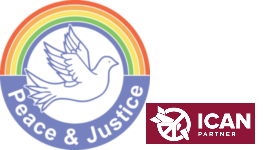On Thursday, 28 January 2016, Patrick Harvie, member of the Scottish Parliament, Quakers in Scotland and the Edinburgh Peace and Justice Centre, hosted a reception to mark the centenary of the Military Service Act at the Scottish Parliament.
The evening included speeches from Trevor Royle (author of ‘The Flowers of the Forest’ the definitive) and Edinburgh University historian Lesley Orr, along with presentations from conscientious objectors and descendants of First World War conscientious objectors, Elisabeth Allen . In addition, three students from St Thomas Aquin’s High School in Edinburgh, Kristy, Rose and India, presented their work on conscientious objectors.
Elizabeth Allen talked about her grandfather John Searson who was an active member of the Independent Labour Party, who eventually was dismissed from his librarian job and sent to Dalmarnock power station to shovel coal.
Another Conscientious Objector was David Turner, aged 15 when the Second World War started. He ran away to the Highlands from his home in Glasgow to escape being conscripted. Sheltered by a friend in a flat in Glen Nevis for two months, he eventually returned to Glasgow and worked for another objector doing decorating work until the war was finally over.
 Joyce Taylor-Richards remembers two generations of conscientious objectors within her family. Her grandfather John Taylor was an engineer, trade unionist and councillor for the Independent Labour Party in Glasgow. He died of an infection at the age of 31 while his application for an exemption was still being processed, after the years of hardship he was facing for his stance against military service and his refusal to work in a munitions factoryat the outbreak of fighting.
Joyce Taylor-Richards remembers two generations of conscientious objectors within her family. Her grandfather John Taylor was an engineer, trade unionist and councillor for the Independent Labour Party in Glasgow. He died of an infection at the age of 31 while his application for an exemption was still being processed, after the years of hardship he was facing for his stance against military service and his refusal to work in a munitions factoryat the outbreak of fighting.

Trevor Allen: Author of Flowers of the Forest
Trevor Royle stressed how crucial it is to understand, that war is more than just about killing. It also involves how society and the average civilian views a particular war. Taking the Conscientious Objection Movement in Britain as an example, opposition to war has existed since the very beginning- even before 1915. In fact, one of the most remarkable opposition movements during WWI was the No Conscription Fellowship. It started promoting the value of humanitarianism already in Autumn of 1914 all across the UK, and began organizing itself in local branches. The No Conscription Fellowship worked against the enthusiasm which had been prevalent at the time of the war’s breakout in 1914- the “great year to volunteer”, in which state publicity and encouragement to join the armed forces, came to fruition.

Many Quakers served in the Friends Ambulance Units and refused to fight. Graphic: Rebecca Lanyon
Already one year later though, the big battles started to take place, killing thousands of men, which made many people finally realize that the army was not all fun, but in fact a killing machine which turned civilians into murders and required the individual to die for the bigger goal. As a result, the public mood started to change and by the end of 1915, the Derby Scheme revealed that more than 1,5 million men considered eligible to fight, in fact had not sign up for war. Based upon this evidence the government was able to bring in conscription through passage of the Military Service Act in January of 1916.

wcml.org.uk
To Britain’s credit, the Act included a provision for exemption from service for those who could show that they had a genuine conscientious objection to participating in war. However, not every individual who did not want to fight in war, was in fact given exemption: Many had to face hardship and social agitation for their decision. People denounced them as weaklings who were escaping their “duty”. The individuals of the Conscientious Objection Movement had been exactly the reverse though; determined and hard- minded individuals who took an active decision against war and who did not mind bearing the consequences- more than 6,000 objectors were imprisoned for several years.

Many Conscientious Objectors were subjected to Field Punishment No. 1
In fact, Patrick Harvie stressed, Quakers worked indefatigably to ensure the recognition of the right to refuse to kill, which was finally instituted through the Conscientious Clause, providing a significant shift toward (individual) freedom. In the midst of World War I, this clause enabled many people to choose whether or not they would participate in war. Accordingly, Britain was the first country to give legal recognition to individual conscience, which is now recognised as a Human Right, marking one of the most important freedoms we have today; the freedom of conscience. Sadly, even in our contemporary world, numerous countries still practice conscription, refusing the right to conscientiously object, forcing men and women into combat.
As a consequence, the heroes of the Conscientious Objection Movement can still inspire us to work for a more peaceful world today. As David Turner, a Quaker emphasized; a fight for peace and a more just world is not one which ends with the settlement of a dispute or conflict, but it is a commitment to nonviolence which lasts for life. Indeed, the answer to what we can learn from the conscientious objectors, seems simple, but it carries a fundamental truth: The only way to avoid war is to refuse to participate. Political problems have political solutions and will hardly get solved by people killing one another.
For anyone interested in discovering more, starting on 29 February, the Quakers’ online project, The white feather diaries, serialises the real letters and diaries of five conscientious objectors, alive during World War I.
By Yalda Salfavian
Photo credits: Brian Larkin


